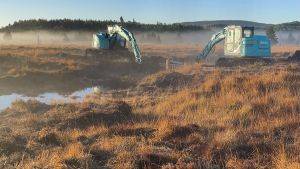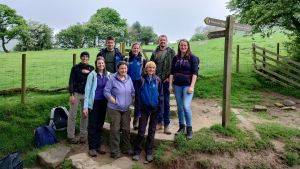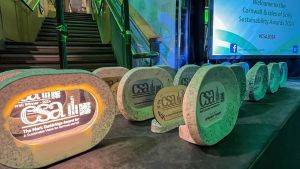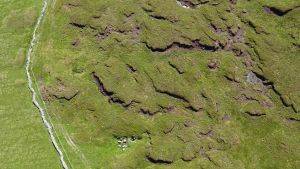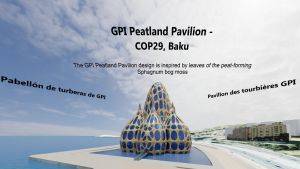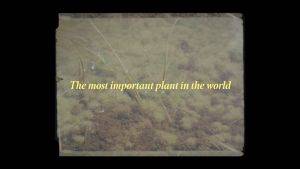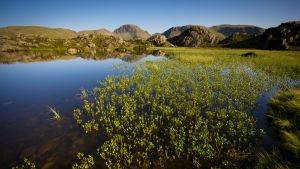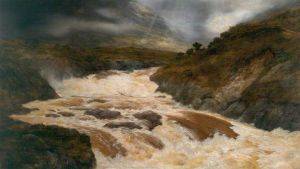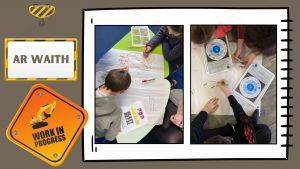Thursday 19th September: topic deep dives (recorded for the Peatland Programme YouTube channel)
8.45am Refreshments
9.20am Updates from the IUCN UK Peatland Programme (Auditorium)
Join IUCN UK Peatland Programme Director Emma Hinchliffe for an update on the IUCN UK Peatland Programme, our recent work and future plans. Find out how you can contribute to our collective vision as we invite the peatland community to inform our ongoing strategy and collaborative work.
Deep dive workshops and knowledge sharing sessions from 10am – 12pm and 1pm – 3pm in the Auditorium, Osprey Arena, Peregrine 1, Peregrine 2 and Strathspey.
‘Assessing bog health’ and ‘Posing peatland questions’ are full day workshops involving a field visit.
Delegates to choose ONE full day session
OR
one AM AND one PM session.
FULL DAY WORKSHOPS
Assessing bog health using a simple condition matrix - FULLY BOOKED
Please note: this workshop covers both the AM and PM workshop slots and will involve a short classroom session followed by training in the field.
Collect a packed lunch from the conference foyer from 8am.
When planning peatland restoration and assessing trajectories of change post-restoration, accurate assessment of habitat condition is of critical importance. Join the IUCN UK Peatland Programme’s Senior Research Advisor Richard Lindsay for a practical workshop exploring a matrix-based approach to bog condition assessment based on microtopography and associated vegetation communities. Richard will introduce the methodology and how to identify assessment units remotely in a classroom session, followed by the opportunity to test the matrix in the field on a blanket bog at Abernethy National Nature Reserve.
The field visit will involve walking ~4km over uneven ground. Please bring appropriate footwear for wet conditions. There are no toilets on site.
Schedule
8am Collect packed lunch from conference foyer
8.15am – 9.15am Classroom session in the Strathspey suite
9.30am – 10.30am Travel to Abernethy field site
10.30am – 2pm Field based training including packed lunch
2pm – 3pm Return to conference venue
Our future is peat
Please note: this workshop will cover both the AM and PM workshop slots and will be mostly field-based.
Collect a packed lunch from the conference foyer from 8am. Please bring your own hand lens and sketching materials if possible.
In this creative workshop, interdisciplinary artist Caroline Vitzthum and members of the youth-led collective RE-PEAT invite delegates to answer peatland questions received from children across the UK. The first part of the day will be spent at Ruthven Barracks, where Orla Craig and Tom Gardner from Historic Environment Scotland will explore historical relationships and perceptions of peatlands. Participants will then travel to RSPB Insh Marshes Nature Reserve, to consider a particular question and engage creatively with the environment to capture notes, drawings, sounds, and collective discoveries. Letters will be composed in response to the children’s questions, to be shared with them and collated into a published collection of work.
To find out more about Caroline’s work, visit https://carolinevitzthumstudio.com/.
To find out more about RE-PEAT’s work, visit https://www.re-peat.earth/.
Transport will be provided from the coach car park. Please ensure you arrive in plenty of time to depart at 10am.
Schedule
10am – 10.30am Travel to Ruthven Barracks
10.30am – 11.30am Explorations of historical relationships
11.30am – 11.40am Travel to Insh Marshes
11.40am – 12.30pm Exploration of site through creative activities
12.30pm – 1pm Lunch
1.30pm – 2.30pm Letter writing
2.30pm – 3pm Return to conference venue
AM WORKSHOPS: 10am – 12pm
Working together at landscape scale on lowland peat
Location: Peregrine 1
In this interactive workshop, participants will consider how to work together across organisations to deliver environmental outcomes on lowland peat. Case study presentations from successful lowland peat projects will set the scene, and groups will draw on real-world examples to consider risks, benefits and potential financing options for landscape scale peat projects.
Chaired by Jordan Champ and Sam Joyce, Defra
Speakers:
Megan Hudson, Fenland SOIL
Peter Jones, Natural Resources Wales
Translational palaeoecology and the art of collaboration: understanding the past for resilient futures
Location: Peregrine 2
Translational palaeoecology offers a collaborative approach to practice-focused research. This workshop will explore this concept to demonstrate how palaeoecology – the ecology of past environments – can be transformed from interesting to actionable. Using restoration scenarios, the workshop will guide participants through a process of translational palaeoecology and demonstrate how an understanding of the past can inform practical management and restoration of peatlands.
Chaired by Jessica Gauld, University of Manchester
Speakers: Morag Angus (SWPP)
Digital MRVs for Peatland Code and other projects
Location: Auditorium
In this knowledge sharing session we will explore the emerging digital tools for Monitoring and Verification of Peatland Code and other peatland projects. Digital technologies present a significant opportunity to improve the efficiency and costs of monitoring and reporting on peatland condition and associated environmental variables, but with the scale and pace of technological development, it can be challenging to understand what is reliable and applicable for peatland projects. This session will introduce a range of organisations and individuals developing and testing these technologies and ask: what can currently be achieved using digital approaches, and where is further development and testing required?
Chaired by Miles Wilson, North Pennines National Landscape
Speakers:
Renée Kerkvliet-Hermans, IUCN UK Peatland Programme
Anne Williams, AI4Peat
David Large, University of Nottingham
Roxane Andersen, University of the Highlands and Islands
Mark Currass, SEAD Artists
Pontus Nordin and Carlos Alvarado, Sylvera
Marjolein Helder, Plant e
Olga Tutubalina, Gentian
Diving the depths: the need for a unified UK-wide approach to peat depth
Location: Strathspey suite
Peat depth as a defining feature for ‘deep peat’ habitats in the UK is a hangover from the post-war period when the main driver was to understand the landscape in terms of the ability to increase productivity. However, this has resulted in a definition that creates an overly simplistic approach, delineating peatland habitats by depth rather than viewing them holistically as a functional mosaic. This session will discuss the need for a unified UK-wide approach to peat depth in policy contexts, legislative/regulator contexts with supporting case studies, practitioner needs along with the technical background as to why there is a need for a different approach to defining the UK’s peatlands.
Chaired by Dave Stone, JNCC
Speakers:
Mark Owen, Natural England
Andrew Midgley, RSPB
Richard Lindsay, University of East London (pre-record)
Emily Taylor, Crichton Carbon Centre
Alistair Lockett, North Pennines National Landscape
Bringing back nature: biodiversity monitoring for a greener future
Location: Osprey Arena
Peatlands are extremely important for biodiversity, and the restoration, protection and sustainable management of these unique habitats is essential to meet our legally binding targets for nature recovery. This knowledge sharing session will outline the policy context behind existing biodiversity strategies and how peatland projects can provide the data needed to evidence progress in delivery. We will focus on the current state of play of biodiversity monitoring and the potential for technology to support us in understanding and reporting on peatland biodiversity.
Chaired by Iain Diack, Natural England
Speakers
Joey Pickard and Mike Shewring, Lost Peatlands Project
Joe Anderson, IUCN UK Peatland Programme
Calum Brown, Highlands Rewilding Ltd.
Max Bodmer, rePLANET
12pm – 1pm Lunch
PM WORKSHOPS: 1pm – 3pm
Native trees, peat and dynamic landscapes - FULLY BOOKED
Location: Peregrine 1
This workshop aims to broaden perceptions of the relationships between native trees and peatlands in the context of landscape-scale restoration, following on from the National Trust hosted webinar ‘Trees and Peat – Interactions in Ecosystem Recovery’ webinar earlier this year. Hear inspiration from Kate Hanley, RSPB Site Manager, who will share the innovative approach being taken at RSPB Dovestones. Delegates are then invited to discuss and prioritise key themes identified during the webinar and presentation and address challenges and opportunities in relation to restoration of natural processes. Input from this session will be used to inform a joint publication on the topic, developed by the National Trust and IUCN UK Peatland Programme. Prior attendance at the webinar is not a requirement and you can catch up on all the talks on the IUCN UK Peatland Programme YouTube channel.
Chaired by Caroline Thorogood, National Trust
Developing a skilled restoration workforce: training and capacity building
Location: Peregrine 2
Accelerating the pace and scale at which peatland is being restored across the UK depends upon having a suitably skilled and knowledgeable workforce to survey, plan, deliver, manage and monitor projects. Increasingly, these skills also require a fluency in blending public and private finance. This workshop will focus on the challenges of developing a skilled workforce capable of meeting ambitious targets and focus on positive action being taken across the UK to address skills and capacity gaps. We will consider the effectiveness of particular skills and workforce interventions; identify where the challenges are with these approaches; explore the potential for collaborative action and consider ‘what’s next’ in the development of the peatland skills supply chain.
Chaired by Becky Shaw, NatureScot Peatland ACTION
Speakers
Emily Taylor, Crichton Carbon Centre
Rachel Urquhart, Albamontane
With an intervention provided by Emma Stewart, Cairngorms National Park Authority
Restoration standards and guidance: driving innovation and improving restoration methods
Location: Auditorium
In this Peatland ACTION-led workshop, Technical Advice Manager Ian McKee will introduce the concept of the Scottish Peatland Standard along with further guidance including the “Principles of restoration” and a suite of decision trees. These resources, along with the Technical Compendium will be regularly updated, incorporating feedback from practitioners. The introduction of the Peatland Standard will drive innovation and improvements to restoration methods in Scotland, in terms of their effectiveness and value for money, and help improve consistency. Presenting a series of case studies from forest to bog restoration practitioners, this knowledge-sharing session will demonstrate the value of applying evidence-led restoration principles.
Chaired by Ian McKee, NatureScot Peatland ACTION
Speakers:
Ian McKee, NatureScot Peatland ACTION
Tim Cockerill, Forestry and Land Scotland
Peter Greening, Duncan Wemyss Ltd.
Are we on the right track? Linear developments on peatlands
Location: Strathspey suite
This session will focus on linear developments: threats, scale, type (permanent and temporary) and associated regulations. Tracks and roads are a hidden and growing issue for peatlands, with research demonstrating impacts including chemical deposition, compaction, alteration of physical properties and divergence of vegetation communities from control areas. We will present research findings on the type, scale and impacts of linear developments, and discuss how best to mitigate them. We’ll also consider the interplay between policy and practice, how this varies across the UK, and how to achieve greater oversight and joined-up thinking on this issue.
Chaired by David Large, University of Nottingham
Speakers
Jessica Fìor-Berry, IUCN UK Peatland Programme
Guaduneth Chico, National Parks and Wildlife Service (Ireland)
Arwel Williams, Welsh Government
Andy Mills, OWC
Mike Shewring, RSPB
Delivering community benefits from peatland projects
Location: Osprey Arena
This session will focus on community benefit sharing from Peatland Code and other projects. The main topics that will be discussed are:
- How do we define a community? Communities in the UK are organised in different ways and this has changed over time, creating challenges for benefit sharing.
- How do we manage challenges around sharing revenue and the potential mismatch between expectations and reality?
- How do we quantify non-financial benefits and how can these be shared?
- How do we develop clear guidance on ensuring parity in these types of projects?
Chaired by Renée Kerkvliet-Hermans, IUCN UK Peatland Programme
Speakers
Uwe Stoneman, Land Commission
Rachel Nixseaman, Deciding Matters
Kenna Chisholm, Flow Country Partnership
Matthew Hannon, University of Strathclyde
3pm - 3.30pm Refreshments
3.30pm – 4.30pm Responding to the challenge plenary session (Auditorium)
A forward-looking panel discussion with members of our UK partnership who collectively own and deliver against the UK Peatland Strategy. We will reflect on the preceding three days of discussion, take home messages from the conference and the panel’s thoughts on how to respond to the challenge of the UK Peatland Strategy and the 2024 Progress Report.
Chaired by Stuart Brooks, IUCN UK Peatland Programme Co-Chair
4.30pm – 6pm Conference close and pack down


